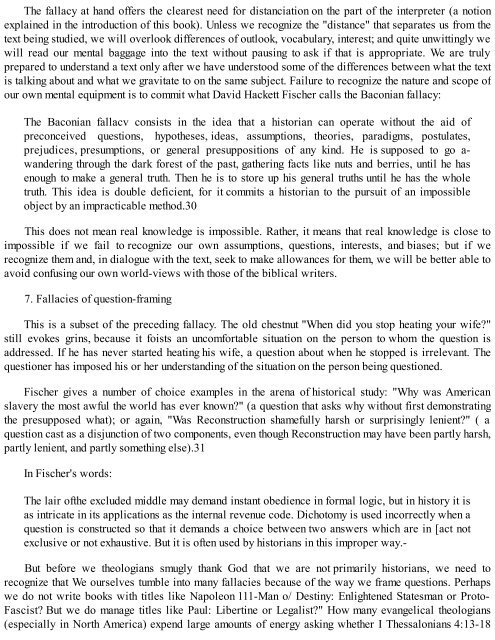Exegetical Fallacies - D. A. Carson
Exegetical Fallacies - D. A. Carson
Exegetical Fallacies - D. A. Carson
Create successful ePaper yourself
Turn your PDF publications into a flip-book with our unique Google optimized e-Paper software.
The fallacy at hand offers the clearest need for distanciation on the part of the interpreter (a notion<br />
explained in the introduction of this book). Unless we recognize the "distance" that separates us from the<br />
text being studied, we will overlook differences of outlook, vocabulary, interest; and quite unwittingly we<br />
will read our mental baggage into the text without pausing to ask if that is appropriate. We are truly<br />
prepared to understand a text only after we have understood some of the differences between what the text<br />
is talking about and what we gravitate to on the same subject. Failure to recognize the nature and scope of<br />
our own mental equipment is to commit what David Hackett Fischer calls the Baconian fallacy:<br />
The Baconian fallacv consists in the idea that a historian can operate without the aid of<br />
preconceived questions, hypotheses, ideas, assumptions, theories, paradigms, postulates,<br />
prejudices, presumptions, or general presuppositions of any kind. He is supposed to go a-<br />
wandering through the dark forest of the past, gathering facts like nuts and berries, until he has<br />
enough to make a general truth. Then he is to store up his general truths until he has the whole<br />
truth. This idea is double deficient, for it commits a historian to the pursuit of an impossible<br />
object by an impracticable method.30<br />
This does not mean real knowledge is impossible. Rather, it means that real knowledge is close to<br />
impossible if we fail to recognize our own assumptions, questions, interests, and biases; but if we<br />
recognize them and, in dialogue with the text, seek to make allowances for them, we will be better able to<br />
avoid confusing our own world-views with those of the biblical writers.<br />
7. <strong>Fallacies</strong> of question-framing<br />
This is a subset of the preceding fallacy. The old chestnut "When did you stop heating your wife?"<br />
still evokes grins, because it foists an uncomfortable situation on the person to whom the question is<br />
addressed. If he has never started heating his wife, a question about when he stopped is irrelevant. The<br />
questioner has imposed his or her understanding of the situation on the person being questioned.<br />
Fischer gives a number of choice examples in the arena of historical study: "Why was American<br />
slavery the most awful the world has ever known?" (a question that asks why without first demonstrating<br />
the presupposed what); or again, "Was Reconstruction shamefully harsh or surprisingly lenient?" ( a<br />
question cast as a disjunction of two components, even though Reconstruction may have been partly harsh,<br />
partly lenient, and partly something else).31<br />
In Fischer's words:<br />
The lair ofthe excluded middle may demand instant obedience in formal logic, but in history it is<br />
as intricate in its applications as the internal revenue code. Dichotomy is used incorrectly when a<br />
question is constructed so that it demands a choice between two answers which are in [act not<br />
exclusive or not exhaustive. But it is often used by historians in this improper way.-<br />
But before we theologians smugly thank God that we are not primarily historians, we need to<br />
recognize that We ourselves tumble into many fallacies because of the way we frame questions. Perhaps<br />
we do not write books with titles like Napoleon 111-Man o/ Destiny: Enlightened Statesman or Proto-<br />
Fascist? But we do manage titles like Paul: Libertine or Legalist?" How many evangelical theologians<br />
(especially in North America) expend large amounts of energy asking whether I Thessalonians 4:13-18



